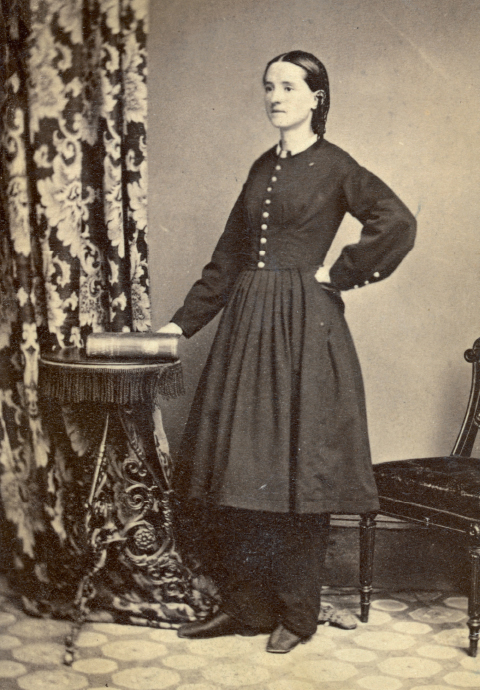Exploring American Histories: Printed Page 407
Exploring American Histories, Value Edition: Printed Page 336
Women Aid the War Effort

Women of all classes contributed to the Union and Confederate war effort in numerous ways. Thousands filled jobs in agriculture, industry, and the government that were traditionally held by men. Others sought to assist the war effort more directly, by serving as nurses, spies, couriers, or soldiers; gathering supplies; and lobbying to influence government policies. Although Rose Greenhow and a few other women were recruited as spies early in the conflict, most military and political officials initially opposed women’s direct engagement in the war. Yet so many women organized relief efforts early on that the federal government organized the U.S. Sanitary Commission to coordinate their efforts. By 1862 tens of thousands of women had volunteered funds and assistance through hundreds of local chapters across the North and Midwest. They hosted fund-raising fairs, coordinated sewing and knitting circles, rolled bandages, and sent supplies to the front lines. With critical shortages of medical staff, some female nurses and doctors eventually gained acceptance in northern hospitals and field camps. Led by such memorable figures as Clara Barton, Mary Ann “Mother” Bickerdyke, and Dr. Mary Walker, northern women almost entirely replaced men as military nurses by the end of the war.
In the South, too, much of the medical care was performed by women. But without a government-sanctioned body to coordinate efforts and lobby for resources, women were left largely to their own devices, and nursing was never recognized as a legitimate profession for them. As a result, a Confederate soldier’s chances of dying from wounds or disease were even greater than those of his Union counterpart. Nonetheless, southern women worked tirelessly to supply soldiers with clothes, blankets, munitions, and food. But this work, too, was often performed locally and by individuals rather than as part of a coordinated Confederate effort. For example, Ann Cobb, the wife of a Georgia officer, went door-to-door among neighbors to gather provisions for her husband’s eighty-man unit.
Some Union and Confederate women played even more unusual roles in the war. A few dozen women joined Greenhow in gathering information for military and political authorities. One of the most effective on the Union side was the former fugitive Harriet Tubman. She worked as a spy in South Carolina from 1862 to 1864 and regularly secured military intelligence from slaves living behind Confederate lines. Even more women served as couriers, carrying messages across battle lines to alert officers of critical changes in military orders or in the opponent’s position. In addition, at least four hundred women disguised themselves as men and fought as soldiers; the identities of many were discovered only after they were wounded in battle.
Finally, abolitionist women sought to influence federal wartime policies. Following the Emancipation Proclamation, Elizabeth Cady Stanton, Susan B. Anthony, and Lucy Stone founded the Women’s National Loyal League and launched a massive petition drive to broaden Lincoln’s policy. Collecting 260,000 signatures, two-thirds of them from women, the League demanded a congressional act “emancipating all persons of African descent” everywhere in the nation.